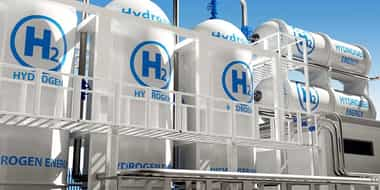
Apr 20, 2023
Blog Energy & Sustainability How carbon capture technologies support the clean power transition
In a bid to secure the future of the planet, we’re locked in a race against the onset of climate change. Transitioning to clean energy will be a key determining factor in achieving our green ambitions, but for both the power sector and industry, carbon capture is the only viable large-scale solution. Also known as CCUS (carbon capture, utilization, and sequestration), the process reduces emissions at a relatively low cost while preserving the value of fossil fuel reserves and existing infrastructures.
The value of these technologies is clear. BCC Research predicts the market for CCUS technologies to reach $5.2 billion by 2026, with a compound annual growth rate of 15% between 2021-2026.
Addressing existing plant emissions
Meeting the energy needs of the growing population while protecting the planet is a problem that has no singular solution. Fossil fuels still produce the most electricity in the world, and despite 21st-century efforts toward sustainability, fossil fuel power has actually risen by 70% since 2000.
Realistically, a combination of renewable technologies and utilizing existing fleets of fossil fuel plants is the only way to meet the growing energy demands. This is where carbon capture comes in. CCUS can help address the carbon output of pre-existing fossil-fuel power plants. By fitting these plants with CCUS technologies, existing power plant owners can recover their investment and lower the cost of transforming their power systems. In Asia, with its young fleet of fossil-based plants, CCUS retrofits are particularly important.
While it’s not a long-term solution, in the near and medium term, updating the energy sector with carbon capture technologies addresses the emissions of the current fossil-fuel power plants.
Can climate objectives be achieved without carbon capture?
Capturing carbon is consistently an integral part of the low-cost power transformation. While some may argue such technologies seem to justify the use of fossil fuels, they still play an important role in supporting energy and climate security goals. This is particularly important in countries where, due to current infrastructure and abundant domestic oil reserves, fossil fuels will remain an important role.
Similarly, some countries have limited potential to adopt renewable energies like solar and wind – or limited access to land. Wind and solar power plants are far bigger than CCUS-equipped plants, which can make installing them difficult.
The inclusion of carbon capture will lower the cost of the power transition significantly. Previous IEA analysis has shown that the low carbon cost in the power sector would rise from around $250/ton CO2 in 2060 by a low carbon pathway to $450/ton CO2 if the availability of CO2 storage was restricted across the global energy system. A 2019 report that targeted regional studies found that if carbon capture was not available, the costs of decarbonization would be around 50% higher for the UK. These costs are 2.5 times higher in Poland and twice that high in New South Wales in Australia. Ultimately, carbon capture will make future energy systems more diverse, helping us to meet sustainability goals quicker and more efficiently.
Net-zero and negative emissions
When combined with bioenergy, carbon capture can help factories become net-zero or even carbon-negative. Emission capture and storage of bioeconomic energy can offset carbon emissions elsewhere. Negative bioenergy emissions with carbon capture result from the fact that biomass absorbs carbon when it grows, and CO2 is released again into the atmosphere when combusted for energy, creating a complete cycle with an adverse impact on the atmosphere. When combined with CO2 capture and storage, much or all of the CO2 absorbed by biomass can be removed from the atmosphere permanently.
These negative emissions play a crucial role in offsetting emissions from other sectors where direct cutting, including long-distance transport and certain industrial processes, is either technologically difficult or prohibitively expensive. Within the energy sector, generators that use bioenergy with carbon capture have the potential to compensate for the emissions from gas-fired peak plants which, however, are incompatible with a net-zero power system. This plays a key role in supporting the economic integration of renewables.
Due to its ability to allow adverse power generation emissions in combination with bioenergy, the long-term value of carbon capture technologies to the power system (and the entire energy system) can continue to increase in line with more ambitious climate targets. In other sectors that are more difficult to offset (i.e., require costly or technologically resilient solutions), adverse emissions can compensate for residual emissions, reducing the energy cost of decarbonization.
Dive into the potential of carbon capture technologies
Carbon sequestration is recognized as one of the most promising options for reducing CO2 emissions, and thereby slowing global warming. BCC Research’s report Carbon Capture, Utilization & Storage Technologies dives into the market for carbon capture, evaluating the potential of the process and future impact.
Download your complimentary report overview or purchase the report in full here.
Alternatively, consider becoming a member of the BCC Research library. Membership can provide access to the full scope of reports within your chosen category. Explore our output in the energy and resources segment and get in touch to enquire about membership today.

Olivia Lowden is a Junior Copywriter at BCC Research, writing content on everything from sustainability to fintech. Before beginning at BCC Research, she received a First-Class Master’s Degree in Creative Writing from the University of East Anglia.

Electrical switches—devices that control the flow of electricity—are the backbon...

As the world accelerates toward net-zero emissions, hydrogen, and ammonia have e...

Hydrogen technology is widely used across industries like glass, fertilizer, met...

We are your trusted research partner, providing actionable insights and custom consulting across life sciences, advanced materials, and technology. Allow BCC Research to nurture your smartest business decisions today, tomorrow, and beyond.
Contact UsBCC Research provides objective, unbiased measurement and assessment of market opportunities with detailed market research reports. Our experienced industry analysts assess growth opportunities, market sizing, technologies, applications, supply chains and companies with the singular goal of helping you make informed business decisions, free of noise and hype.